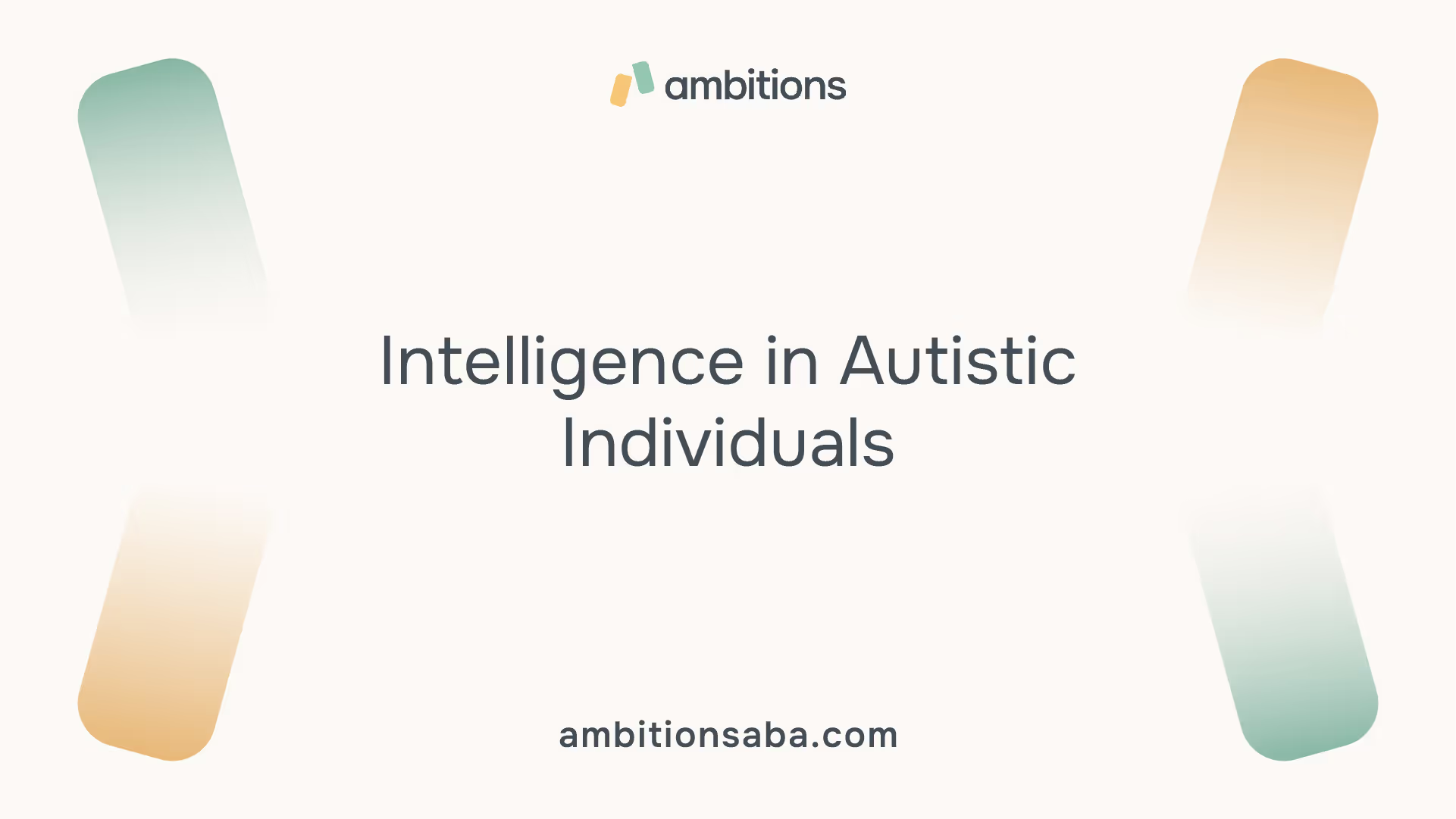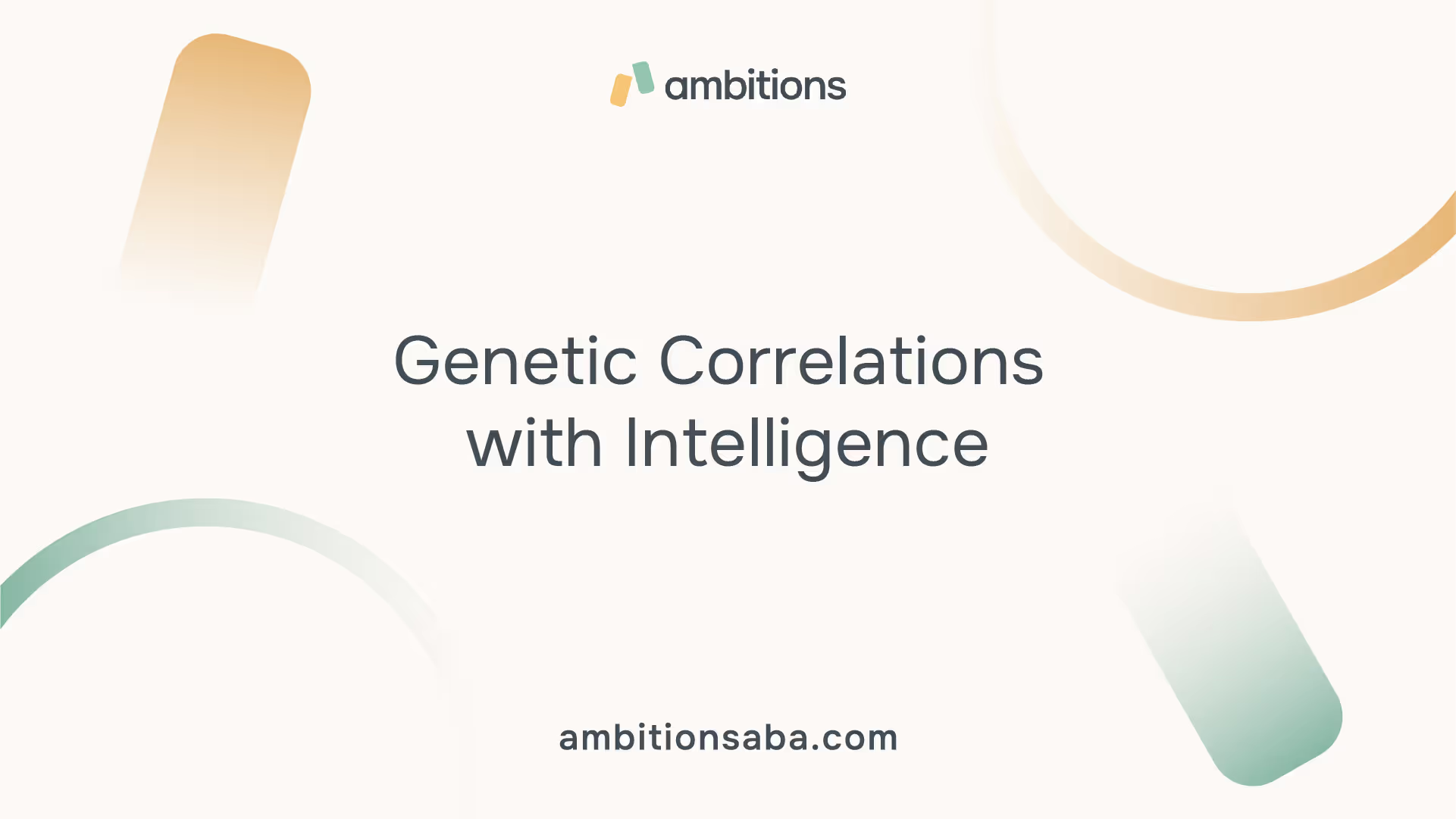Understanding Autism Intelligence
Autism, often referred to as a spectrum disorder, encompasses a wide range of abilities and challenges. It is important to dispel the misconception that all autistic individuals have intellectual disabilities. While some individuals with autism may have intellectual disabilities, many others have average or above-average intelligence.

Dispelling Misconceptions
One common stereotype surrounding autism is the assumption that all autistic individuals have intellectual disabilities. However, this is not accurate. Autism is a spectrum disorder, and each person on the autism spectrum has their own unique set of strengths and weaknesses. While some autistic individuals may have intellectual disabilities, many others have average or above-average intelligence. It's important to recognize the diversity of cognitive profiles within the autism community.
Diverse Cognitive Profiles
Autistic individuals often exhibit unique cognitive profiles that differ from neurotypical individuals. Some autistic individuals demonstrate exceptional attention to detail and pattern recognition abilities, which can be advantageous in fields that require precision and accuracy, such as engineering, computer programming, or scientific research. These individuals may possess strengths in visual thinking, problem-solving, and analytical skills, contributing to their overall cognitive abilities.
Standard intelligence tests, which heavily rely on verbal communication and language skills, may not accurately capture the cognitive abilities of autistic individuals. This is because some autistic individuals may experience challenges with verbal expression or understanding. However, non-verbal intelligence tests provide an alternative way to assess cognitive abilities without relying heavily on verbal skills, allowing for a more accurate evaluation of the unique cognitive strengths of autistic individuals.
By understanding the diverse cognitive profiles of autistic individuals and dispelling misconceptions about intelligence and autism, we can better appreciate the unique strengths and abilities that individuals with autism bring to the table. It is important to focus on nurturing their talents and providing support tailored to their specific needs.
Intelligence in Autistic Individuals
Autistic individuals often possess unique cognitive strengths and abilities that contribute to their intelligence. Contrary to misconceptions, intelligence comes in various forms and can be observed in individuals with autism. Let's explore some aspects of intelligence that are frequently observed in autistic individuals.

Attention to Detail
One of the remarkable characteristics commonly seen in autistic individuals is their exceptional attention to detail. They often possess a heightened ability to notice and focus on intricate details that others may overlook. This acute observation skill allows them to perceive patterns and connections that might not be immediately apparent to others. This attention to detail can be advantageous in fields that require precision and accuracy, such as engineering, computer programming, or scientific research. Autistic individuals may excel in these areas, leveraging their keen eye for detail to make unique contributions.
Unique Cognitive Strengths
Autistic individuals exhibit diverse cognitive profiles that differ from neurotypical individuals. While they may face challenges in certain areas, they often possess unique cognitive strengths. Some of these strengths include exceptional analytical skills, strong long-term and rote memory abilities, creative thinking, and visual-spatial skills. These cognitive strengths can be harnessed and applied in various domains, enabling autistic individuals to excel in fields that align with their strengths and interests.
Non-Verbal Intelligence Tests
Standard intelligence tests often heavily rely on verbal communication and language skills, which can pose challenges for autistic individuals who may have difficulties with verbal expression or understanding. However, non-verbal intelligence tests provide an alternative way to assess cognitive abilities without relying heavily on verbal skills. These tests showcase the unique cognitive strengths of autistic individuals and allow their intelligence to be recognized and measured in a way that is more aligned with their abilities.
For example, autistic individuals have shown enhanced performance in Raven's Matrices, a classic intelligence test involving completing visual patterns. This highlights their analytical skills and their ability to identify complex visual patterns. Non-verbal intelligence tests provide a more accurate representation of the cognitive abilities of autistic individuals, allowing their intelligence to be acknowledged and appreciated.
Understanding and recognizing the intelligence of autistic individuals requires acknowledging their unique cognitive strengths and abilities. By embracing their attention to detail, leveraging their unique cognitive profiles, and utilizing non-verbal intelligence tests, we can better appreciate and support the intelligence of individuals on the autism spectrum.
Genetic Correlations with Intelligence
When exploring the relationship between autism and intelligence, it's important to consider the genetic factors at play. Recent research has shed light on positive genetic correlations between autism and measures of mental ability, suggesting that certain genetic factors may contribute to both autism and high intelligence. This indicates that alleles for autism overlap broadly with alleles for high intelligence, implying that individuals with autism may possess a unique cognitive profile that includes high intellectual capabilities.

Positive Genetic Correlations
Studies have shown that there is a positive genetic correlation between autism risk and measures of mental ability. This finding challenges the long-held belief that autism is solely associated with relatively low intelligence. The overlapping alleles for autism and high intelligence indicate a complex relationship between these two conditions.
Positive assortative mating, where individuals with similar traits are more likely to mate, is observed for intelligence. This leads to a concentration of relevant alleles among offspring and an increase in additive genetic variance for intelligence [5]. This genetic correlation suggests that there is a potential for high intelligence in individuals with autism.
Cognitive Abilities in Autism Genes
The genetic correlations mentioned above indicate that there are shared genetic factors between autism and high intelligence. It is hypothesized that autism etiology commonly involves enhanced, but imbalanced, components of intelligence. This means that individuals with autism may exhibit exceptional cognitive abilities in certain areas while facing challenges in others.
The link between autism genes and cognitive abilities suggests a more nuanced understanding of intelligence in the context of autism. While traditional intelligence tests may not fully capture the cognitive strengths of individuals with autism, it is important to recognize and appreciate their unique abilities.
Understanding the genetic correlations with intelligence helps challenge the misconception that individuals with autism lack intelligence. It highlights the need for a more comprehensive and individualized approach to assessing intellectual capabilities in individuals with autism. By recognizing and nurturing their unique cognitive strengths, we can better support and appreciate the intelligence of individuals with autism.
Historical Figures and High Intelligence
Throughout history, there have been notable individuals who are believed to have exhibited signs of autism, showcasing a link between autism and high intelligence. These historical figures include Thomas Jefferson, Orson Welles, Wolfgang Mozart, Albert Einstein, Isaac Newton, and Carl Sagan [3]. Their achievements and contributions in various fields provide further evidence of the unique cognitive abilities of individuals on the autism spectrum.
Notable Individuals
- Thomas Jefferson: Known as one of the founding fathers of the United States, Thomas Jefferson was an influential figure in American history. He displayed remarkable intellectual prowess, contributing to the writing of the Declaration of Independence and serving as the third President of the United States.
- Orson Welles: Renowned for his groundbreaking work in theater, radio, and film, Orson Welles was a creative genius. His directorial masterpiece, "Citizen Kane," is considered one of the greatest films of all time.
- Wolfgang Mozart: One of the greatest composers in history, Wolfgang Mozart began composing music at an early age and composed over 600 works. His musical genius continues to inspire and captivate audiences worldwide.
- Albert Einstein: Regarded as one of the most brilliant scientists of all time, Albert Einstein revolutionized our understanding of the universe with his theory of relativity. His contributions to physics earned him the Nobel Prize.
- Isaac Newton: A key figure in the scientific revolution, Isaac Newton's laws of motion and universal gravitation laid the foundation for modern physics. His discoveries continue to shape our understanding of the natural world.
- Carl Sagan: An astrophysicist, cosmologist, and science communicator, Carl Sagan popularized science through his books and television series, including "Cosmos: A Personal Voyage." His ability to convey complex scientific concepts to the general public made him an influential figure in the field.
Linking Autism and High IQ
Autistic individuals often demonstrate above-average intelligence and frequently score in the gifted range, with an IQ of 140 or higher [3]. Recent studies have reported positive genetic correlations between autism risk and measures of mental ability, indicating that the alleles for autism overlap broadly with alleles for high intelligence [5].
The concept of positive assortative mating, where individuals with high intelligence tend to form relationships with others who possess high intelligence, contributes to the concentration of relevant alleles for intelligence among offspring. This, in turn, increases the additive genetic variance for intelligence.
While autism has long been associated with relatively low intelligence, recent studies have challenged this notion by demonstrating a significant overlap between alleles for autism and high intelligence. This suggests that autism etiology commonly involves enhanced, but imbalanced, components of intelligence.
These findings highlight the complexity of the relationship between autism and intelligence. While autistic individuals may face certain challenges, their unique cognitive strengths and potential for high intelligence should be recognized and celebrated.
IQ Distribution in Autism
When considering autism and intelligence, it is important to understand the distribution of IQ scores within the autistic population. While older studies suggested that a larger proportion of individuals with Autism Spectrum Disorder (ASD) had below-average intelligence, more recent research has provided a more nuanced perspective.
Bimodal IQ Distribution
Recent studies have reported a bimodal IQ distribution within individuals with ASD, indicating two distinct peaks in IQ scores. One peak is centered around the average range, while the other peak is in the above-average range. This bimodal distribution suggests that a significant percentage of individuals with ASD have above-average intelligence [6]. In fact, a study of individuals seen at specialized outpatient clinics found that a substantial proportion had IQ scores in the above-average range.
Above-Average Intelligence Rates
It is worth noting that a significant percentage of individuals with ASD demonstrate above-average intelligence. Clinical studies have shown that approximately 40% of individuals with ASD have IQ scores indicating above-average intelligence [6]. This finding challenges the stereotype that individuals with autism are universally characterized by lower intelligence.
The positive genetic correlations between autism risk and measures of mental ability further support the observation that alleles for autism overlap broadly with alleles for high intelligence. In other words, there is evidence to suggest that individuals with autism may possess a unique cognitive profile that includes high intellectual capabilities.
Understanding the distribution of IQ scores in autism helps dispel misconceptions about intelligence and autism. It highlights the diverse cognitive profiles within the autistic population and emphasizes the importance of recognizing the intellectual strengths and abilities of individuals with autism.
Challenges and Abilities
While individuals with autism may face unique challenges, they also possess exceptional abilities and talents that are worth recognizing and celebrating. Two notable aspects of these abilities are Savant syndrome and exceptional talents.
Savant Syndrome
Savant syndrome refers to the remarkable skills and talents displayed by some individuals with autism. Although it is not present in all autistic individuals, approximately 10% demonstrate advanced levels of a particular skill. These skills can vary widely in type and degree. It's important to note that specific and focused interests, often mistaken for savant abilities, are common among autistic individuals [7].
Savant skills can manifest in various areas, such as mathematics, music, art, or memorization. Autistic individuals with Savant syndrome exhibit extraordinary abilities that surpass typical expectations, showcasing the exceptional diversity and complexity within the autism spectrum. While the prevalence of Savant syndrome is relatively low, it highlights the incredible potential and unique cognitive profiles that can exist within the autism community.
Exceptional Talents
Autistic individuals often possess exceptional talents that are distinct from savant skills. Many exhibit a heightened attention to detail, allowing them to notice and focus on intricate aspects that others may overlook. This acute observation skill enables them to perceive patterns and connections that might not be immediately apparent to neurotypical individuals. It can lead to unique insights and problem-solving approaches, making autistic individuals valuable contributors in fields that require precision and accuracy, such as engineering, computer programming, or scientific research.
In addition, autistic individuals often display excellent long-term and rote memory abilities, creative skills, and visual-spatial skills. These talents contribute to their unique cognitive profiles and can be beneficial in various academic and vocational pursuits. They exhibit enhanced performance in tasks involving analytical reasoning and complex visual pattern recognition, as demonstrated by their high performance in tests like Raven's Matrices.
It's important to recognize and nurture these exceptional talents and abilities in individuals with autism. By providing appropriate support and opportunities, we can help them thrive and contribute their unique perspectives and skills to society.
Understanding the challenges and abilities of individuals with autism is crucial in promoting inclusivity and appreciating the diverse range of talents and strengths within the autism community.
References
[1]: https://www.goldstarrehab.com/parent-resources/are-autistic-people-smart
[2]: https://iidc.indiana.edu/irca/articles/academic-supports-for-college-students-with-an-autism-spectrum-disorder.html
[5]: https://www.ncbi.nlm.nih.gov/pmc/articles/PMC4927579/
[6]: https://www.ncbi.nlm.nih.gov/pmc/articles/PMC9058071/
[7]: https://www.onecentralhealth.com.au/autism/10-myths-about-autism/



